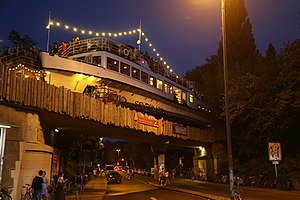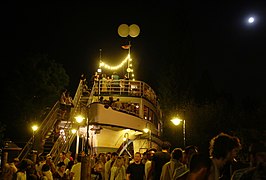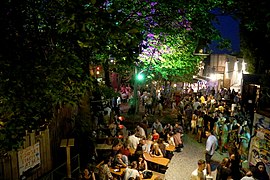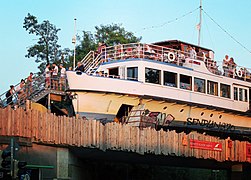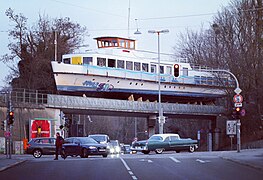
Munich is the capital and most populous city of the Free State of Bavaria. With a population of 1,578,132 inhabitants as of 31 May 2022, it is the third-largest city in Germany, after Berlin and Hamburg, and thus the largest which does not constitute its own state, as well as the 11th-largest city in the European Union. The city's metropolitan region is home to about six million people and the third biggest metropolitan region by GDP in the European Union.

Ammersee is a Zungenbecken lake in Upper Bavaria, Germany, southwest of Munich between the towns of Herrsching and Dießen am Ammersee. With a surface area of approximately 47 square kilometres (18 sq mi), it is the sixth largest lake in Germany. The lake is at an elevation of 533 metres (1,749 ft), and has a maximum depth of 81 metres (266 ft). Like other Bavarian lakes, Ammersee developed as a result of the ice age glaciers melting. Ammersee is fed by the River Ammer, which flows as the Amper out of the lake. Like neighbouring Lake Starnberg - deeper, bigger in surface area, similar in shape - it is a popular location for watersports.
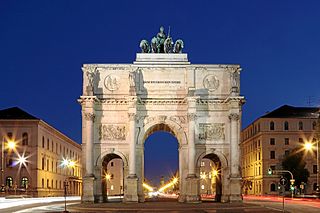
Schwabing is a borough in the northern part of Munich, the capital of the German state of Bavaria. It is part of the city borough 4 (Schwabing-West) and the city borough 12 (Schwabing-Freimann). The population of Schwabing is estimated at about 100,000, making it one of the largest districts of Munich. The main boulevard is Leopoldstraße. (For further information on the Munich boroughs, see Boroughs of Munich.)

The Class 420 is a commuter electric multiple unit train type in service on German S-Bahn networks since 1972. Their use in Munich during the 1972 Summer Olympics earned them the colloquial name Olympiatriebwagen.

Dießen am Ammersee is a municipality in the district of Landsberg in Bavaria in Germany. It is located on the shores of the Ammersee.
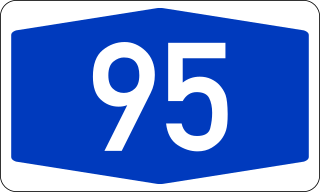
Bundesautobahn 95 is a motorway in southern Germany, supposed to connect Munich with Garmisch-Partenkirchen.

Schondorf am Ammersee is a municipality in the district Landsberg am Lech, Bavaria, Germany and is a member of the municipal association Schondorf am Ammersee The municipal association based in Schondorf.

A nightclub is a club that is open at night, usually for drinking, dancing and other entertainment. Nightclubs often have a bar and discothèque with a dance floor, laser lighting displays, and a stage for live music or a disc jockey (DJ) who mixes recorded music. Nightclubs tend to be smaller than live music venues like theatres and stadiums, with few or no seats for customers.

The Zürichsee-Schifffahrtsgesellschaft or Lake Zürich Navigation Company is a public Swiss company operating passenger ships and boats on Lake Zürich.

Munich South Ring is the common name for a railway line running near the centre and through the southern districts of the Bavarian state capital of Munich. It connects Munich East station to the Munich Central Station (Hauptbahnhof) and Laim marshalling yard. Operationally it is mostly included in the Munich–Rosenheim railway.

Sendlinger Straße is an important shopping street in Munich's city center. It extends into the Munich old town in the south-east-northeast direction from the Sendlinger Tor in the west to the point where Fürstenfelder Straße and the Rindermarkt meet in the east. In July 2016, the conversion from a one-way street into a pedestrian zone was attempted.

Ekkeland Götze is a German painter, printmaker and conceptual artist.

Katharina Elisabeth Schulze is a German politician of Alliance 90/The Greens who has been serving as a member of the State Parliament of Bavaria (Landtag) since 2013. Along with Ludwig Hartmann, she was one of the two leading candidates of her party in the 2018 Bavarian state election. Since 2019, she has been part of her party's national leadership, under co-chairs Annalena Baerbock and Robert Habeck.

The Bahnwärter Thiel is a techno club, music venue and alternative cultural center in Munich, Germany. It is named after the novella "Bahnwärter Thiel" by German author Gerhart Hauptmann.

The Lindwurmstraße is a 2.4-kilometer poplar alley in the Munich districts Ludwigsvorstadt-Isarvorstadt and Sendling.
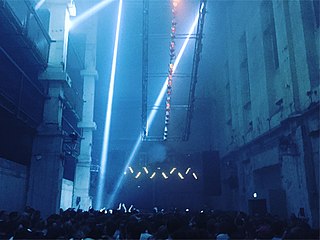
MMA Club(Mixed Munich Arts Club) was a techno nightclub in Munich, Germany, renowned as one of the best in Germany in the 2010s. It was a multifaceted establishment based inside the husk of an old thermal power plant and has hosted underground techno DJs such as Richie Hawtin, Adam Beyer, Len Faki, Ben Klock, Marcel Dettmann, Ben Sims or Terence Fixmer, among many others. The maze-like club also contained a 460-square-meter gallery space frequently utilized for a variety of theatrical, artistic and orchestral performances.
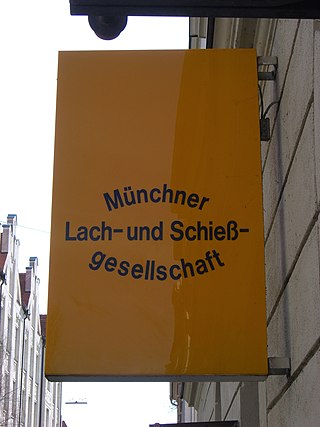
The Münchner Lach- und Schießgesellschaft is a German political kabarett that runs at its own theatre in Schwabing, Munich. It was founded in 1956 by journalist Sammy Drechsel and comedian Dieter Hildebrandt, who were soon joined by Klaus Peter Schreiner. Walter Kabel was responsible for the show's music from 1956 to 1972, which included his own compositions.

The Blitz Club is a techno nightclub in the Munich district of Ludwigsvorstadt-Isarvorstadt.

Bauernhofmuseum Jexhof is a farm museum located in the southern part of the Fürstenfeldbruck District, in Bavaria, Germany, approximately 700 meters southeast of the district road FFB 7 from Schöngeising to Mauern. The farm is situated in the hamlet of Jexhof within the municipality of Schöngeising, in a valley in the western foothills of the Wildmoos nature reserve. The museum is part of the "Landpartie – Museums around Munich" network and is operated by the Fürstenfeldbruck District. It is supported by the Jexhof Association.

The Atomic Café was a discotheque and live club that ran from January 1997 to the end of 2014 in Munich, Germany. The club was a regular venue for up-and-coming international bands and was award winning for playing music styles Indie, Beat, Garage, Punk, Psychedelic Pop, Northern Soul, Deep Funk and at times Drum and Bass. The club gained international fame in the relevant scenes. The overall design was guided by the two graphic designers Christian Heine and Roland Schunk, who founded and ran the club. It was decorated in blood red, orange, sun yellow and cyan; the design was based on Verner Panton, Googie architecture and the Space Age design of the 1960s. The club had a capacity of up to 600 people.
